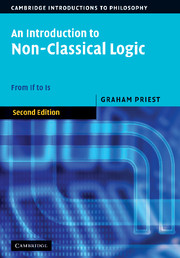Book contents
- Frontmatter
- Contents
- Preface to the First Edition
- Preface to the Second Edition
- Mathematical Prolegomenon
- Part I Propositional Logic
- Part II Quantification and Identity
- 12 Classical First-order Logic
- 13 Free Logics
- 14 Constant Domain Modal Logics
- 15 Variable Domain Modal Logics
- 16 Necessary Identity in Modal Logic
- 17 Contingent Identity in Modal Logic
- 18 Non-normal Modal Logics
- 19 Conditional Logics
- 20 Intuitionist Logic
- 21 Many-valued Logics
- 22 First Degree Entailment
- 23 Logics with Gaps, Gluts and Worlds
- 24 Relevant Logics
- 25 Fuzzy Logics
- Postscript: A Methodological Coda
- References
- Index of Names
- Index of Subjects
15 - Variable Domain Modal Logics
Published online by Cambridge University Press: 05 June 2012
- Frontmatter
- Contents
- Preface to the First Edition
- Preface to the Second Edition
- Mathematical Prolegomenon
- Part I Propositional Logic
- Part II Quantification and Identity
- 12 Classical First-order Logic
- 13 Free Logics
- 14 Constant Domain Modal Logics
- 15 Variable Domain Modal Logics
- 16 Necessary Identity in Modal Logic
- 17 Contingent Identity in Modal Logic
- 18 Non-normal Modal Logics
- 19 Conditional Logics
- 20 Intuitionist Logic
- 21 Many-valued Logics
- 22 First Degree Entailment
- 23 Logics with Gaps, Gluts and Worlds
- 24 Relevant Logics
- 25 Fuzzy Logics
- Postscript: A Methodological Coda
- References
- Index of Names
- Index of Subjects
Summary
Introduction
15.1.1 In this chapter we will look at the other variety of semantics for quantified modal (and tense) logic: variable domain.
15.1.2 We will start with K and its normal extensions. Next we observe how matters can be extended to tense logic.
15.1.3 There are then some comments on other extensions of the logics involved.
15.1.4 The chapter ends with a brief discussion of two major philosophical issues that variable domain semantics throw into prominence: the question of existence across worlds, and the connection (or lack thereof) between existence and the particular quantifier.
Prolegomenon
15.2.1 Perhaps the most obvious objection to constant domain semantics is as follows. Just as the properties of objects may vary from world to world, what exists at a world, it is natural to suppose, may vary from world to world. Thus, I exist at this world, but in a world where my parents never met, I do not exist. Or, at this world, Sherlock Holmes does not exist, but in a world that realises the stories of Arthur Conan Doyle, he does.
15.2.2 Another way of making the point is as follows. Consider the following formulas:
BF: ∀x□A ⊃ □∀xA
CBF: □∀xA ⊃ ∀x□A
These are usually called the Barcan Formula and the Converse Barcan Formula, respectively. Both of these are valid in CK (and a fortiori stronger constant domain logics), as may be checked. But intuitively they are invalid.
Information
- Type
- Chapter
- Information
- An Introduction to Non-Classical LogicFrom If to Is, pp. 329 - 348Publisher: Cambridge University PressPrint publication year: 2008
